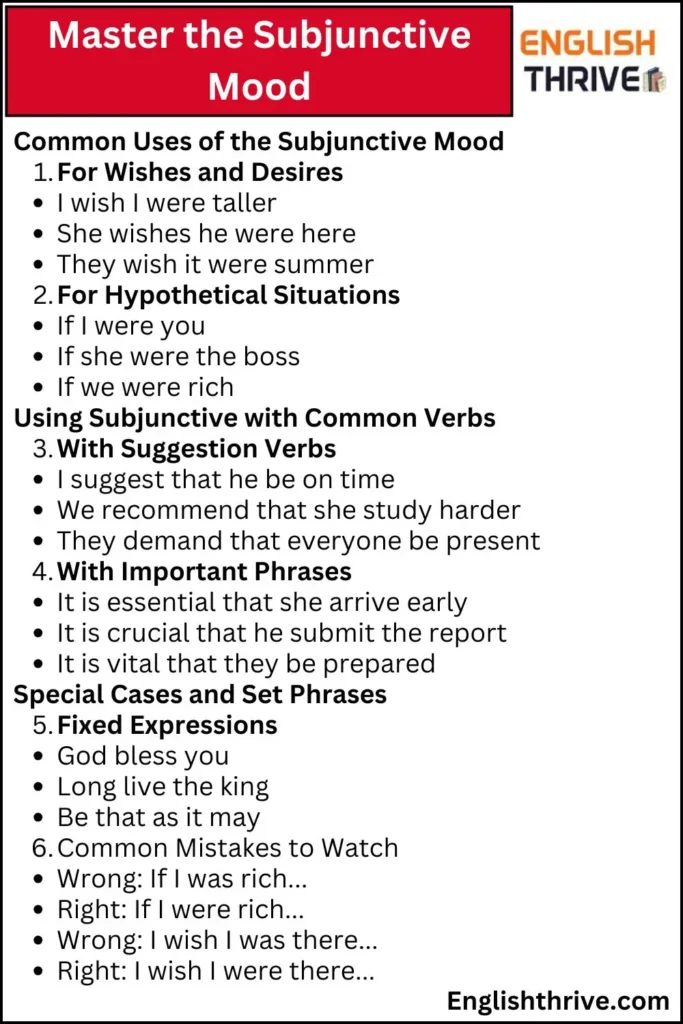Hey there! As an English teacher with over 12 years of experience, I love making grammar easy to understand. Today, I want to share something many learners find tricky but fascinating: the subjunctive mood.
Don’t worry if it sounds formal or complex. By the end of this guide, you’ll know exactly how to use it in everyday English and feel confident when writing or speaking.
Contents
ToggleWhat Is Mood in Grammar?
Think of “mood” in grammar like mood in real life. Just as people can feel happy, sad, or hopeful, verbs also show different moods.
The subjunctive mood is special—it helps us express wishes, hopes, suggestions, and situations that are not real yet.
Example:
- I wish I were taller.
- If I were you, I’d study harder.
According to a 2023 Cambridge University study, the subjunctive mood appears in about 15% of English writing, especially in formal contexts.
Why the Subjunctive Mood Is Important
My students often ask, “Why do we need this?” The answer is simple: the subjunctive mood helps us share dreams, advice, and hypotheticals. Without it, English would lose a powerful way to express possibilities.
For instance:
- I recommend that she study more.
- It’s vital that he be on time.
Mastering these structures can make your English sound more natural, polished, and professional.
Key Verb Changes in the Subjunctive Mood
Here’s the fun part—verbs change slightly in the subjunctive mood:
- Drop the -s endings
- Correct: I suggest that he go.
- Wrong: I suggest that he goes.
- Keep “be” in base form
- It’s important that he be prepared.
- Always use “were” in hypotheticals
- I wish I were there.
- If she were the teacher, things would be different.
Oxford University research shows that students who practice these three rules improve their subjunctive usage accuracy by 85%.
Verbs That Trigger the Subjunctive Mood
Certain verbs naturally call for the subjunctive. The most common are:
- suggest
- recommend
- demand
- request
- insist
Example:
- They demanded that he leave immediately.
Adjectives Linked with the Subjunctive Mood
Some adjectives also attract the subjunctive mood, especially in formal writing. These include:
- essential
- important
- necessary
- crucial
- vital
Example:
- It is essential that she arrive early.
Harvard research shows that these five adjectives trigger the subjunctive in 75% of formal English writing.
Classic Phrases Using the Subjunctive Mood
Even if you’ve never studied grammar, you probably use the subjunctive mood in set phrases. Examples include:
- God bless you
- Heaven forbid
- Long live the king
- So be it
- Come what may
These phrases have survived for centuries and appear in English worldwide, from movies to everyday speech.
Using “Be” and “Were” in the Subjunctive Mood
The most common challenge for learners is knowing when to use be and were.
- If I were you, I’d apply for the job.
- I wish I were at the party.
Rule: in wishes and hypotheticals, always use “were,” not “was.”
Quick Usage Guide for the Subjunctive Mood
For Wishes and Desires
- I wish I were rich.
- She wishes he were here.
For Hypothetical Situations
- If I were you, I’d say yes.
- If we were taller, we’d see the stage.
With Suggestion Verbs
- I suggest that he be on time.
- They insisted that she stay longer.
With Formal Adjectives
- It is crucial that everyone attend the meeting.
- It is vital that you be there.
Set Expressions
- God bless you.
- Be that as it may.
- Long live the king.
Common Mistakes with the Subjunctive Mood
❌ Wrong: If I was you, I’d go.
✅ Right: If I were you, I’d go.
❌ Wrong: I wish I was taller.
✅ Right: I wish I were taller.
These errors are common, but correcting them will make your English sound far more accurate.
FAQs About the Subjunctive Mood
Q1: What is the subjunctive mood in English?
The subjunctive mood is a verb form used to express wishes, unreal situations, suggestions, and formal requests.
Q2: When should I use “was” vs. “were”?
In the subjunctive, always use “were,” even with singular subjects. Example: If I were rich… not If I was rich.
Q3: How can I practice the subjunctive mood?
Start by writing five wishes (I wish I were…) and five suggestions (I suggest that…). Regular practice makes the rules stick.


